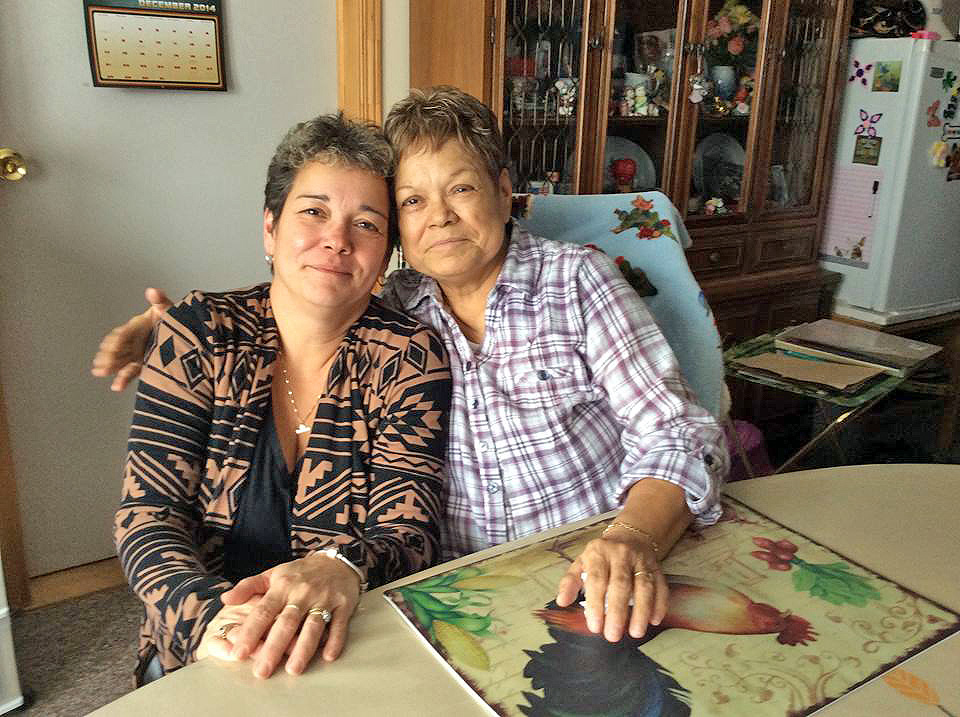|
This page was exported from Bancroft this Week
[ https://www.bancroftthisweek.com ] Export date: Thu Apr 3 22:22:19 2025 / +0000 GMT |
Journey continues for Heather Sararas Heather Sararas and her mother on the day that they met after 47 years. Heather was “scooped” by a child welfare agency when she was four in what has become known as the '60s Scoop of aboriginal children in Canada following the closure of most residential schools. / SUBMITTED By Jim Eadie In May 2016, this newspaper carried the remarkable story of local social worker Heather Sararas, who was not searching, but to her joy accidentally found her birth mother. Sararas learned that at the age of four she was “scooped” from her mother during the now infamous '60s Scoop of aboriginal children in Canada following the closure of most residential schools. As many as 20,000 aboriginal children in Canada were removed from their families between 1960 and 1980, and fostered or adopted nationally and internationally. The term '60s Scoop was coined by Justice Kimelman in a 1984 Manitoba child welfare report, who concluded his report by saying: we can now state unequivocally that cultural genocide has been taking place in a systematic and routine manner.” In 2014 Sararas was completing her Ryerson University social work degree program for indigenous students, and had a chance encounter with an employee at the Tyendinaga Wellness Centre reception for students. The employee, who turned out to be her cousin, was just leaving her shift, but noticed her and was sure she might be her long-lost cousin. She gathered the courage to ask, and it was soon established who was who, and a reunion was to be arranged with mom. “If I had come to the centre four minutes later, I would never have met my mom,” said Sararas. In June 2015, Sararas brought her proud mother with her to Toronto for her graduation ceremonies. Present as a guest was Justice Murray Sinclair, chairperson of the Truth and Reconciliation Commission (Canada), who had a lengthy conversation with her mom. “This was a moment of great meaning and peace for my mother,” said Sararas. “To meet him and receive his encouragement and affirmation.” Many years feeling shame, guilt and incredible sadness were lifted for a woman who had never been offered any care or support in her circumstances. The May newspaper article noted that “an unbelievable journey is just beginning for Heather Sararas,” and for her whole family. Little did anyone know that a few weeks after the newspaper article was published, Heather's mom would pass away suddenly and unexpectedly from a heart attack. “I was there a few days before,” said Sararas. “I sat there knitting, and she was reading a book. We talked. Now I can feel very lonely. I really miss her. In the two years that I knew her, she became not only my mom, but she became my best friend. It was a true friendship, closer than I have ever been to anybody.” Most of her life Sararas had missing pieces that even she did not want to know. “All my life I believed that my mom didn't want me,'' she said. “This has now validated me, and made me a stronger person. The missing puzzle pieces have come together, and I feel completed. I am absolutely 100 per cent at peace now.” Sararas quietly said that she often feels her mom's presence as she goes about her life. Her mother had become very connected to the family, and extended family members “My little grandson Cohen who is three was on the floor with some toys the other day,” said Sararas. “His mom asked him what he was doing, and he told her he was playing with G.G. That's what the family called mom.” Sararas feels that she has been gifted a real opportunity to teach, and educate others. She currently looking at becoming involved in local school programs, and bringing her experiences to children about the '60s Scoop and truth and reconciliation. Even the original newspaper article has stirred up a lot of local interest in learning more about this unfortunate part of Canadian history. Sararas herself has had many conversations with interested people, and the Children's Aid Societies regional offices in the province are using the article as resource material. The piece has also generated huge interest on social media with many organizations devoted to aboriginal support and information internationally providing links to the newspaper article. |
| Excerpt: In May 2016, this newspaper carried the remarkable story of local social worker Heather Sararas, who was not searching, but to her joy accidentally found her birth mother. Sararas learned that at the age of four she was “scooped” from her mother during the now infamous ’60s Scoop of aboriginal children in Canada following the closure of most residential schools. |
|
Post date: 2017-01-05 15:40:18 Post date GMT: 2017-01-05 20:40:18 Post modified date: 2017-01-05 15:40:18 Post modified date GMT: 2017-01-05 20:40:18 |
| Powered by [ Universal Post Manager ] plugin. HTML saving format developed by gVectors Team www.gVectors.com |